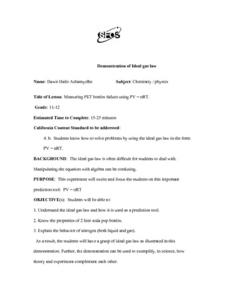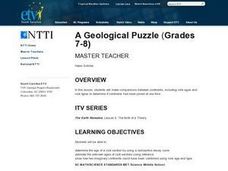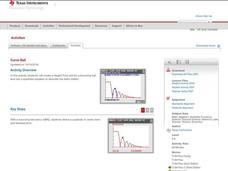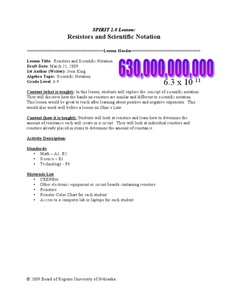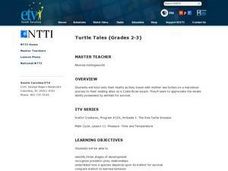Texas Instruments
TI-Nspire™ CAS
When it comes to rating educational calculators, this calculator is always near the top of this list. Now it's available as an app. There is a lot of calculator power wrapped up in this app. Not only is this a fully functioning...
Teach Engineering
Equal and Opposite Thrust in Aircraft: You're a Pushover!
It's the law—every action requires a reaction, no matter how small. Pupils experience two demonstrations of Newton's third law of motion as it relates to thrust in the 10th segment of a 22-part unit on flight. Using their mathematical...
Curated OER
Bouncing Ball
Students collect height versus time data of a bouncing ball using the CBR 2™ data collection device. Using a quadratic equation they graph scatter plots, graph and interpret a quadratic function, apply the vertex form of a quadratic...
University of Colorado
Modeling Sizes of Planets
The density of the huge planet of Saturn is 0.7 g/cm3, which means it could float in water! In the second part of 22, science pupils explore the size and order of the planets. They then calculate weight and/or gravity and density of...
NASA
What's the Frequency, Roy G. Biv?
While all light travels at the same speed, each color in the visible light spectrum contains a different wavelength and frequency. Scholars determine the relationship between frequency and wavelength as they complete the activity. They...
Curated OER
Name That Tune: Matching Musical Tones Through Waveform Analysis
Pupils detect the waveform of musical notes to determine the code for the "safe" in this forensics simulation lesson. They use a microphone and tuning forks along with Vernier EasyData on their graphing calculator to analyze five musical...
University of Colorado
Can Photosynthesis Occur at Saturn?
In the 19th activity of 22, learners determine if distance from a light source affects photosynthesis. Participants capture oxygen in straws and find that the amount of water the gas displaces is proportional to the rate of photosynthesis.
Curated OER
Get the Picture!
Astronomers practice downloading data from a high-energy satellite and translate the data into colored or shaded pixels. As a hands-on activity, they use pennies to simulate high-energy satellite data and they convert their penny...
University of Colorado
Patterns and Fingerprints
Human fingerprint patterns are the result of layers of skin growing at different paces, thus causing the layers to pull on each other forming ridges. Here, groups of learners see how patterns and fingerprints assist scientists in a...
Curated OER
Demonstration of Ideal Gas Law
You know that liquid nitrogen turns into a gas at room temperature. Place some in a two-liter bottle for a physics demonstration of the ideal gas law. Beware, however; this is a dangerous demonstration! Not to mention that you may not...
Curated OER
A Geological Puzzle
Students compare and contrast the various types of rocks on each continent. In groups, the calculate the rock ages and types to determine if the continents, in their opinion, were joined at one time. They develop two imaginary...
Curated OER
Sum of Products and Product of Sums Expression
In this electrical circuit worksheet, students answer a series of 21 questions about sum of product and product of sum, and Boolean expression for a logic circuit. They design and build a circuit board using PC-board relays to show...
Curated OER
Curve Ball
Learners explore the concept of parabolas by collecting quadratic data on a bouncing ball as it is falling using a motion detector. They plot the data and determine the equation of the quadratic in vertex form, then determine the values...
Curated OER
Surface Area of a Leaf (Grades 7-9)
In this math and science worksheet, students read about the process of photosynthesis and plant growth. They determine how a plant's ability to create food is dependent on the surface area of its leaves using geometric calculations. They...
Curated OER
Resistors and Scientific Notation
Students explain the importance of scientific notation. In this physics lesson, students determine the resistance of resistors using the colored bands. They compare and contrast scientific notation and resistor band notation.
Alabama Learning Exchange
Properties of Minerals
High schoolers explore the basic building blocks of our planet. For this minerals lesson high schoolers begin the process of forensics on the basis of investigation and drawing conclusions from observations.
Curated OER
Getting to Know Soil
Students make predictions and analyze soil. In this soil properties lesson, students make predictions about soil properties for various soil samples. Students examine the types of soils and record their observations. Students analyze...
Curated OER
Changing Ramp Heights
Students conduct an experiment to determine how the change in ramp height affects the distances a ball is able to move a stationary cup. Data is collected from several trials and recorded and analyzed.
Curated OER
Turtle Tales
Students watch videos and fill out worksheets about the turtles and their journey to the Costa Rican beach. In this turtles lesson plan, students learn and discuss survival, predator and prey, and stages of development.
Alabama Learning Exchange
Writing Word Equations
Students explore the concept of chemical formulas. In this chemical formula lesson, students watch a video about balancing chemical equations. Students conduct an experiment using silver nitrate and sodium phosphate. ...
Curated OER
Make Your Own "Weather" Map
Learners create their own "weather" map using data from x-ray sources. They analyze and discuss why it is important to organize data in a fashion in which is easy to read. They compare and contrast different x-ray sources using a stellar...
Curated OER
Jell-O Optics
Students observe an activity with Jell-O to learn about optics. In this investigative lesson students fill out a handout on the activity that helps them to investigate the index of refraction and the speed of light.
Alabama Learning Exchange
Float or Sink?
Experiment with mass and density as scholars figure out what makes things float or sink. First, they watch a podcast introducing these concepts. Be sure to use the comprehension question to test their understanding. Young scientists...
Curated OER
Watershed Lesson Plan
Students are introduced to the concepts of a watershed, stream flow and water quality. This five-day plan is an excellent way to introduce students to the concepts involved. They create their own watershed using a paper bag, water and...









